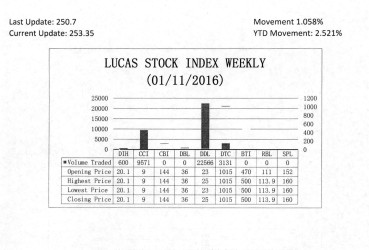Contribution
While small businesses may not generate as much money as large corporations, they are a critical component of, and a major contributor to, the strength of local economies. In many parts of the world, small businesses present new employment opportunities and serve as the building blocks of  the largest corporations. They contribute to local economies by bringing growth and innovation to the community in which the business is established. They also help to stimulate economic growth by providing employment opportunities to people who may not be employable by larger corporations. In less developed economies, small businesses are employed in the fight against poverty. This socio-economic role has been given to small businesses in the Guyana economy over the years. A point of interest is whether this strategy has been effective not only in the fight against poverty, but in helping to integrate the economy of Guyana. This article seeks to discuss this issue in light of the apparent proliferation of small businesses in the country and the need to better understand the sector.
the largest corporations. They contribute to local economies by bringing growth and innovation to the community in which the business is established. They also help to stimulate economic growth by providing employment opportunities to people who may not be employable by larger corporations. In less developed economies, small businesses are employed in the fight against poverty. This socio-economic role has been given to small businesses in the Guyana economy over the years. A point of interest is whether this strategy has been effective not only in the fight against poverty, but in helping to integrate the economy of Guyana. This article seeks to discuss this issue in light of the apparent proliferation of small businesses in the country and the need to better understand the sector.
Resilient
It is easy to discuss small businesses in a generic sense. They display many features some of which could have meaning for the growth and prosperity of the sector. Factors such as resilience, competition and size are important when discussing small businesses. Many contend that small businesses are the most resilient component of the Guyana economy, even though they are easily undermined. It is easy to start a small business in any industry where the entrepreneur is armed with a vision and formidable barriers to entry do not exist. Lax enforcement of zoning laws and easy access to operating space encourage persons who feel the need to set up shop. Not even restrictive trade policies have been able to eliminate the small entrepreneur. What one found was that tough policies and tough enforcement helped to push small business out of the official economy and into the unyielding grasp of the undisciplined and unregulated market.
Variation in size

The Lucas Stock Index (LSI) rose 1.058 percent during the first period of trading in January 2016. The stocks of four companies were traded with 35,868 shares changing hands. There was one Climber and no Tumblers. The stocks of Demerara Distillers Limited (DDL) rose 8.70 percent on the sale of 22,566 shares. In the meanwhile, the stocks of Banks DIH (DIH), Caribbean Container Inc. and Demerara Tobacco Company (DTC) remained unchanged on the sale of 600; 9,571 and 3,131 shares respectively.
One has to be conscious that the discussion about small businesses can be muddled by the reality of their variation in size. To many, the small business is a risky but likely viable business that satisfies certain common conditions. A review of the approach adopted by other Commonwealth countries reveals a common method for identifying a small business. The identification method relies on satisfying a combination of performance and economic factors. Starting in 1988, there has been to date a 27-year process to bring micro and small businesses back into the economic mainstream and under the influence of national fiscal and monetary policy. A cornerstone of current national and international efforts to harness the power of small businesses in Guyana is the Small Business Act of 2004. The Act defines a small business as any business that employs 25 people or less and either has revenues of $60m or less or assets of $20m or less. The business can assume any organizational form and must have profit-making as its motive.
The Act does not make a distinction between micro and small businesses, even though the Fiscal Enactment (Amendment) Bill of 2003 might give readers a clue. In that Bill, the government gives the Guyana Revenue Authority the right to use a presumptive method to determine the taxable income of businesses with sales of less than $10m. The idea behind this assessment method is to capture revenues from businesses that fly under the radar screen and the businesses most likely to do so and earn less than $10m in sales are the micro businesses. While some small businesses might feel offended, it is reasonable to surmise, in the absence of a clear definition of the concept, that any business with revenue below $10m is a micro business.
Nano in size
But, small businesses are nano in size too, if one were to borrow a term from the natural sciences. Nano businesses are thought to have incomes of less than $1 million and are not necessarily judged by the factors of employment and assets. The nano category could fit vendors on the corner of the road selling a single product like water or with a tray with a variety of candies, chips and beverages. There are those who occupy the pavement in the downtown shopping areas. The small business can also be housed in a building and present itself differently from those on the streets.
It is not clear how often tests are done to determine if businesses that classify themselves as small businesses truly satisfy the standard. The testing needs can help to determine if a business needs to be added to the value-added tax roll or if it qualifies for the concessionary financing that is often offered by the government. In other words, one needs to wonder if any attempt is made to verify the data that small businesses submit when seeking the support of the government.
All sectors
Small businesses can be found in all sectors of the economy. According to the Institute of Private Enterprise Development (IPED), small businesses can be found predominantly in two sectors, namely the agricultural sector and the services sector. Within the agricultural sector, rice farming predominates followed by livestock and other crops. Within the services sector, the distribution services and transport are the principal activities. The activities in the two sectors account for nearly 96 per cent of the activities in the small business sector. However, small businesses can be found in the manufacturing and mining sectors as well, indicating that they straddle all sectors of the Guyana economy.
But the principal impact of small businesses is in agriculture and distribution services. The concentration of small businesses in the agriculture and services sectors point to two key features about small businesses in Guyana. One is the low level of technology and capital that are required to start an agricultural business and the ease with which persons can access operating space to buy and sell goods. Those two factors also influence the degree of competition that can be found in the environment in which small businesses operate. Those areas are found to be highly competitive with many buyers and sellers operating in that segment of the economy.
Integration unclear
Despite straddling so many sectors, one is yet to see the integration of small businesses into the wider economy through more visible linkages with larger or diverse businesses. A hallmark of small businesses in many parts of the world is the extent to which their survival is intertwined with the operations of larger companies. In other words, one would expect to see more outsourcing of activities by larger companies in Guyana that give rise to the creation of small businesses to serve those markets. Information on the outsourcing of activities does not seem to be available and that makes it hard to reach a definitive conclusion about the scope for integrating small businesses with larger ones. One observer felt that small businesses might be created by larger business, but it is done by insiders. If true, then maybe the lack of confidence in finding people with the desired skills or needed capital might force companies to form smaller companies to get the job done. This factor too is deserving of inquiry.
Impact on employment
The importance of understanding the small business environment is the impact that it has on job creation. Job creation has been the most signal contribution of small enterprises to economies, including Guyana. Turning to the 2014 Annual Report of IPED for some insight, small businesses were responsible for sustaining at least 10,342 jobs in that year. Assuming that the employment figures reported by the Bank of Guyana are correct, the small business sector accounted for four per cent of the jobs in the country. Making the further assumption that each small business supports a household of four then over 41,000 persons can be depending on the success of a small business. While that is not a large figure, it points to the need to gain a better understanding of the impact that small businesses truly have on Guyana.








